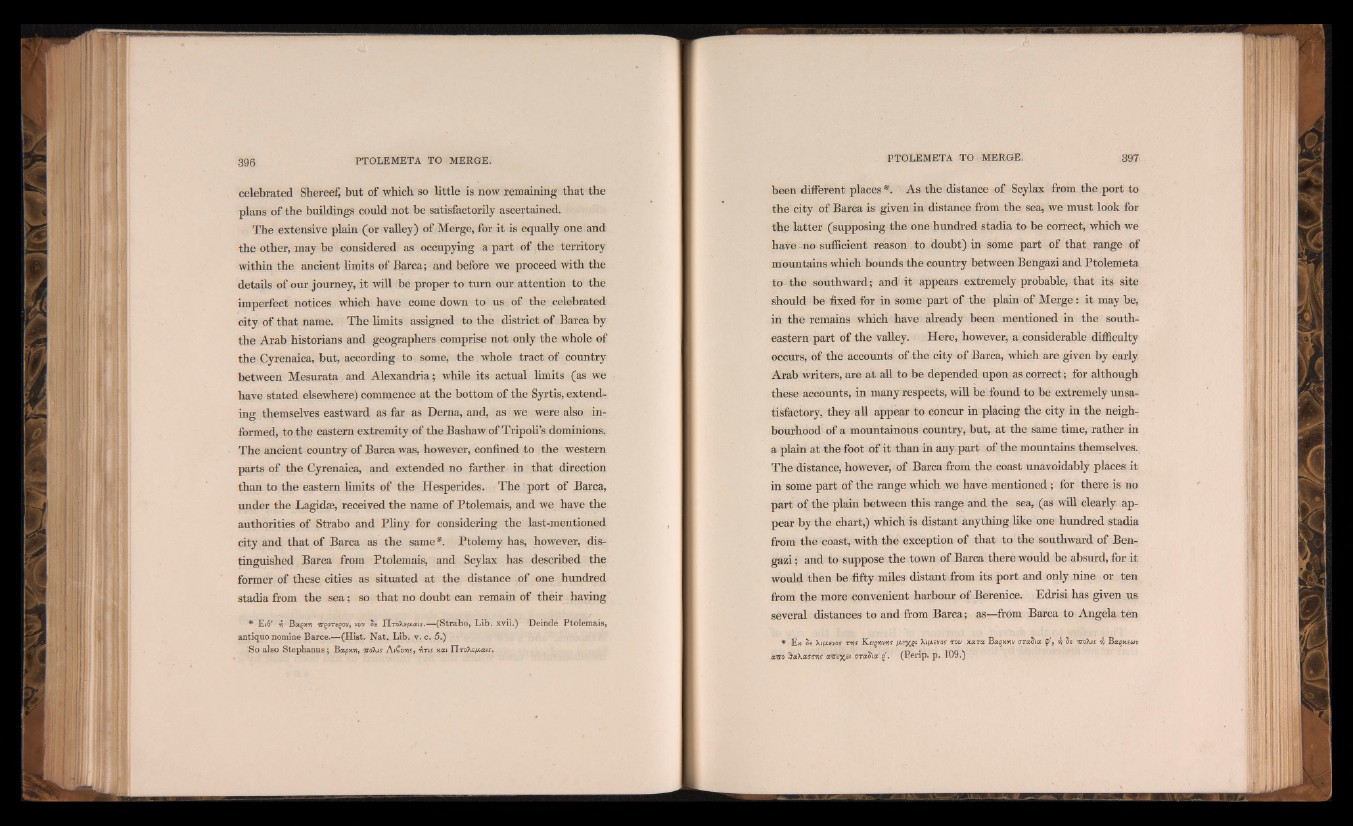
celebrated Sbereef, but of which so little is now remaining that the
plans of the buildings could not be satisfactorily ascertained.
The extensive plain (or valley) of Merge, for it is equally one and
the other, may be considered as occupying a part of the territory
within the ancient limits of Barca; and before we proceed with the
details of our journey, it will be proper to turn our attention to the
imperfect notices which have come down to u s, of the celebrated
city of that name. The limits assigned to the district of Barca by
the Arab historians and geographers comprise not only the whole of
the Cyrenaica, but, according to some, the whole tract of country
between Mesurata and Alexandria; while its actual limits (as we
have stated elsewhere) commence at the bottom of the Syrtis, extending
themselves eastward as far as Derna, and, as we were also informed,
to the eastern extremity of the Bashaw of Tripoli’s dominions,
The ancient country of Barca was, however, confined to the western
parts of the Cyrenaica, and extended no farther in that direction
than to the eastern limits of the Hesperides. The port of Barca,
under the Lagidas, received the name of Ptolemais, and we have the
authorities of Strabo and Pliny for considering the last-mentioned
city and that of Barca as the same*. Ptolemy has, however, distinguished
Barca from Ptolemais, and Scylax has described the
former of these cities as situated at the distance of one hundred
stadia from the sea; so that no doubt can remain of their having
* E»0’ -n B a q w vrqoreqov, w v Se flroX e / x a iy ,— (Strabo, Lib. xvii.) Deinde Ptolemais,
antiquo nomine Barce.—(Hist. Nat. Lib. v. c. 5„)
So also Stephanus; Bapxvt, ttoX i s AiQims, vtns xai YItoXsi^xis.
been different places *. As the distance of Scylax from the port to
the city of Barca is given in distance from the sea, we must look for
the latter (supposing the one hundred stadia to be correct, which we
have -no sufficient reason . to doubt) in some part of that, range of
mountains which bounds the country between Bengazi and Ptolemeta
to the southward; and it appears extremely probable, that its site
should be fixed for in some part of the plain of Merge: it may be,
in the remains which have already been mentioned in the southeastern
part of the valley. Here, however, a considerable difficulty
occurs, of the accounts of the city of Barca, which are given by early
Arab writers, are at all to be depended upon as correct; for although
these accounts, in many respects, will be found to be extremely unsatisfactory,
they all appear to concur in placing the city in the neighbourhood
of a mountainous country, but, at the same time, rather in
a plain at the foot of it than in any part of the mountains themselves.
The distance, however, of Barca from the coast unavoidably places it
in some part of the range which we have mentioned; for there is no
part of the plain between this range and the sea, (as will clearly appear
by the chart,) which is distant anything like one hundred stadia
from the coast, with the exception of that to the southward of Bengazi
; and to suppose the town of Barca there would be absurd, for it
would then be fifty miles distant from its port and only nine or ten
from the more convenient harbour of Berenice. Edrisi has given us
several distances to and from Barca; as—from Barca to Angela ten
* Ex tie Xtptsvof t y i s K uqrivvis /*£%§* Xj/xevos- rou x a r a Baqxvtv g tc v S ic l <p', vt iroXts ri Buqxscuv
awro ttrotkctamjy cc7t£%zi avahoc q. (Berip. p. 109.)